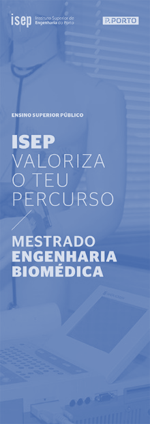 Biocerâmicos com superfícies microfabricadas para regeneração óssea
Biocerâmicos com superfícies microfabricadas para regeneração óssea Resumo
Despite the considerable evolution on bone tissue engineering strategies, currently used bone-related implants have a limited lifespan in the body and some still exhibit failure in function due to lack of osteointegration.
A new focus on tissue regeneration has been the development of biomaterials that can elicit specific biological responses at implantation. It is well established that modifying the surface topography of a biomaterial has a positive effect on regeneration.
The research presented in this talk focus on different techniques to develop surface topography on hard bioceramics in order to improve the biological response to these materials.
The interaction of cells and bacteria with microfabricated surfaces and the modulation of cells behaviour and differentiation pathways through topographical stimuli will be addressed
Ângela Carvalho![]()




